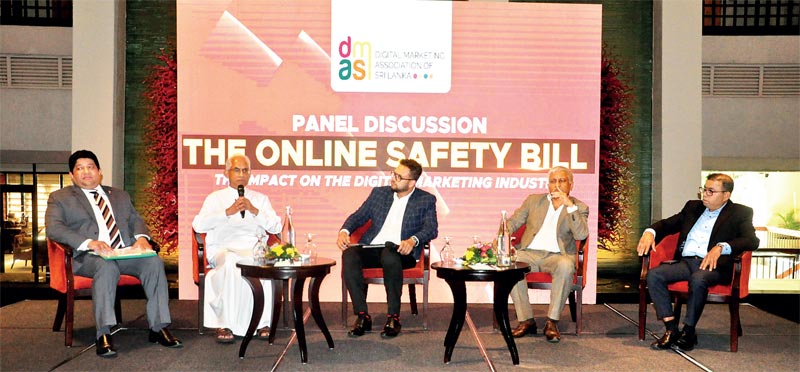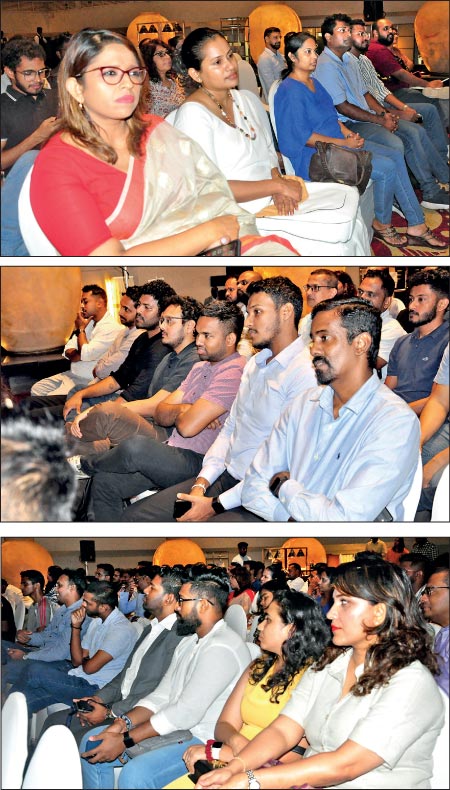Saturday Feb 21, 2026
Saturday Feb 21, 2026
Monday, 12 February 2024 00:43 - - {{hitsCtrl.values.hits}}

From left: President Counsel Jagath Wickramanayaka, Member of Parliament Eran Wickramaratne, DMASL President Umair Wolid, LIRNEasia Chairperson Prof. Rohan Samarajiva and Ogilvy Digital MD Lalith Sumanasiri – Pic by Sameera Wijesinghe
 By Medha de Alwis
By Medha de Alwis
The Digital Marketing Association of Sri Lanka (DMASL) recently organised a panel discussion on Online Safety Act No. 9 of 2024.
DMASL President Umair Wolid said that there is apprehension among all stakeholders such as the civil society, digital intermediaries, online influencers and media that the new Act might impede freedom of speech of the online community.
He said DMASL has actively called upon the government to reconsider and amend the contentious Online Safety Act to ensure a seamless operation of the Sri Lanka digital marketing ecosystem.
“The Digital Marketing Association of Sri Lanka remains committed to collaborating with the government to find solutions that facilitate a thriving Digital Marketing ecosystem, benefiting businesses, consumers, and the nation›s overall digital economy. We firmly believe that amendments to the Online Safety Act are essential to address the specific challenges faced by the Digital Marketing industry in Sri Lanka. The current legislation, in its present form, may impede the industry›s ability to thrive and contribute significantly to our nation›s digital economy,» Wolid said.
DMASL is urging the Government to consider revising the law to align it with the dynamic nature of the digital marketing sector, ensuring that it can operate efficiently and contribute substantially to the country›s digital growth.
The DMASL forum featured SJB MP Eran Wickramarathna, LIRNEasia Chairman Prof. Rohan Samarajiva, President’s Counsel Jagath Wickramanayake and Ogilvy Digital Managing Director Lalith Sumanasiri as panellists who highlighted key concerns.
During the discussion, the panel unanimously voiced concerns over the suitability of the Online Safety Bill, now law, for fostering a healthy digital marketing environment and supporting the growth of a robust digital economy. The consensus among these influential figures highlighted the need for amendments to better align the legislation with the dynamic nature of the Digital Marketing industry.
While hindrance to freedom of expression was the main focus of discussion, some of the other pivotal issues raised were, constitutionality of the new law, unavailability of a proper system to aptly execute the positive aspects of the law, adverse political climate which might exploit the new law to its own advantage and the unfair limitations that the professional online personnel would feel when engaged in their respective careers.
Given the weight of the heavy corporate budget currently invested in social media, it was speculated that digital marketing intermediaries would not feel comfortable to carry out their business given the restriction on statements as stipulated in the Online Safety Act. A grave concern on the same is the influx of foreign investment that could be discouraged due to such limitations amounting to criminal offences if found guilty with.
With regard to prohibition of online communication of false statements, Section 12 of the Act, states that “Any person, whether in or outside Sri Lanka, who poses a threat to national security, public health or public order or promotes feelings of ill-will and hostility between different classes of people, by communicating a false statement, commits an offence and shall on conviction be liable to imprisonment for a term not exceeding five years or to a fine not exceeding five hundred thousand rupees or to both such imprisonment and fine.”
There are precautions taken by the new law against rioting. In Section 14, it is clearly stated that online provocation or incitement that causes rioting shall be liable for imprisonment of a term of five years if the offence of rioting be committed, and of a term of three years, even if the offence be not committed.
Disturbing religious assembly by false statement is covered in Section 15 of the new Act, stipulating that “Any person, whether in or outside Sri Lanka who by communicating a false statement, voluntarily causes disturbance to any assembly lawfully engaged in the performance of religious worship or religious ceremonies, commits an offence and shall on conviction be liable to imprisonment of either description for a term not exceeding three years, or to a fine not exceeding three hundred thousand rupees, or to both such imprisonment and fine.”
The discussion ended with a strong emphasis on the need to press for amendments. The panellists and the audience urged each other to create a movement to impose pressure on the law makers in order to amend the law to be just and fair.